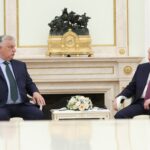February and March 2025 saw historical time compress. Within the span of acouple of months, we witnessed the precursors of major shifts in the world order—changes that typically take years to materialize. On 12 February, the President of the United States called the President of Russia, the leader of an enemy country. Two days later, on 14 February, the U.S. Vice President delivered a speech at the International Security Conference in Munich—one that left European allies stunned. By February 18, Russian and American dignitaries were in Riyadh, Saudi Arabia, discussing the resumption of broad-based relations. The following day, on 19 February, the U.S. President dismissed his Ukrainian counterpart as a “modestly successful comedian” and a “dictator.” Finally, on 28 February, the world watched the dramatic Trump-Zelensky confrontation unfolding in the White House. As Alexander Baunov (Entered by the Ministry of Justice of the Russian Federation in the register of organizations performing the functions of a foreign agent as of 12/22/2023) aptly put it (his words will be referenced frequently in this article), Volodymyr Zelensky “feels that he has moral and historical rightness on his side, which has entered into an… insoluble contradiction with the one who… materially provided for this rightness.” On March 18, the Presidents of the United States and Russia held another phone conversation, during which Vladimir Putin’s response to Donald Trump’s proposal for a 30-day truce was interpreted in contrasting ways. Those who view Russia’s invasion of Ukraine as unprovoked and support continued military aid to Kiev argued that Putin rejected the proposal. However, those who see the war, which began in February 2022, as primarily a proxy conflict between Russia and the U.S. welcomed the apparent rapprochement between the two leaders. They believed that Trump’s suggestion and Putin’s response signaled a potential diplomatic breakthrough, which could pave the way to resolving the conflict.
I am writing this article in the aftermath of this entire political earthquake. The fallout from the Trump-Zelensky confrontation and from the Trump-Putin phone talk aligns with Carl Schmitt’s understanding of the political: it is ultimately reducible to the existential distinction between friend and enemy. According to Schmitt, this is the most intense division in society, one that absorbs and overrides all others—ethical, aesthetic, intellectual. Nowhere is this principle more evident than in the contrasting assessments of Zelensky’s meeting with Trump. To those in Zelensky’s camp, he emerged as a hero of near-mythical proportions—a leader who refuses to sell out his homeland, does not “play cards,” and dares contradict even the U.S. President. To his opponents, however, he was humiliated—publicly flogged, put in his place, exposed as weak and pathetic. The same polarization applies to Trump. His supporters see him as a truth-teller, someone willing to voice the hard truth others fear to express. His critics view him as a “mafia boss” who undermines Western values and betrays Ukraine. In their eyes, his conduct in the meeting was inappropriate, even disgraceful. It is difficult to recall a modern political moment in which perspectives were so diametrically opposed—where observers witnessed the same event yet described it in completely contradictory terms. This suggests that political divisions have reached their absolute extreme: a total bifurcation into friends and enemies on a global scale.
The Power of Entrenched Perceptions
Another dimension of this polarized discourse is the role of the media in reinforcing friend-enemy distinctions over time. Once entrenched, these perceptions become exceedingly difficult to alter. Any attempt to do so risks triggering cognitive dissonance. This was evident on 2 March, when Fox News Sunday anchor Shannon Bream interviewed Tulsi Gabbard, the newly appointed Director of National Intelligence. Gabbard listed a series of Ukraine’s democratic backslidings—canceling elections, silencing and criminalizing political parties, shutting down churches, suppressing opposition, and imposing full government control over the media. Bream’s response was telling: “The way that you described Ukraine is the way that most Americans and most of the world understand Russia. Is it essentially choosing the lesser of two evils?” She further noted that 81% of Americans distrust Vladimir Putin and that Russian Foreign Minister Sergei Lavrov—a figure widely perceived as a “bad guy”—had praised Trump for using “common sense.” This was a quintessential Carl Schmitt moment. Politically engaged Americans “know” that Russia is the enemy because the media has reinforced this narrative for years. Meanwhile, Ukraine has been framed as a steadfast ally—especially since 2014, when the U.S. played a role in reshaping Ukraine’s leadership, and even more so after Russia’s 2022 invasion. Most Americans believe—Shannon Bream seemingly among them—that this is because the U.S. is defending Ukraine’s democracy, not merely expanding its own sphere of influence at Russia’s expense.

Yet the new U.S. administration, now guided by realist foreign policy thinking, appears to see things differently.

To illustrate how deeply ingrained these narratives are, consider an earlier moment: on 23 January, 2018, then-Vice President Joe Biden openly admitted on camera that he had pressured the Ukrainian government into firing its Prosecutor General by leveraging U.S. financial aid. At the time, Biden had no doubt that the Western public was firmly sold on a worldview that categorized Ukraine as a friend and Russia as an enemy.
Breaking Free from Fabricated Narratives: A Tale of Two Pundits
How can one escape this clash of irreconcilable, meticulously constructed narratives? How can we mentally unshackle ourselves and think clearly? One method is to identify the exceptions that prove the rule—rare moments of overlap where even adversaries acknowledge the same reality. These instances, however infrequent, have the potential to reveal deeper truths and even spark breakthroughs in understanding.
Two Russian authors, Alexander Baunov[1] and Alexander Dugin, share a first name but little else. They represent opposite ends of Russia’s intellectual spectrum. Dugin, once hyperbolically described as “Putin’s brain,” is a far-right political philosopher and the leading theorist of neo-Eurasianism. In his most well-known work, Foundations of Geopolitics, he advocates for Russia to reclaim its influence through strategic alliances and territorial expansion to counterbalance the purported Atlanticist empire led by the United States. Baunov[2], by contrast, is a committed liberal. From 2015 until his emigration in 2022, he was a senior associate at the Carnegie Moscow Center, a U.S.-funded think tank. Since leaving Russia, he has held a similar position at the Berlin-based Carnegie Russia Eurasia Center and serves as editor-in-chief of Carnegie Politika. His most recent book, The End of the Regime: How Three European Dictatorships Ended, reflects his broader analytical focus.
Dugin and Baunov[3] are heirs to two long-standing Russian intellectual traditions: Slavophiles and Westernizers. In modern Russian discourse, Slavophile successors are often labeled “national patriots,” while Westernizers retain their historical designation or are simply called “liberals.” Both traditions, however, are deeply shaped by their response to the West. Philosopher Nikolai Berdyaev (The Origins and Meaning of Russian Communism, The Russian Idea) noted that both movements, despite their apparent opposition, stem from a single preoccupation—Russia’s place in the world and its relationship with European civilization. Westernizers argue that Russia must emulate the West’s economic and political systems to overcome its historical backwardness. Slavophiles, on the other hand, insist that Russia is so spiritually distinct from the West that comparisons themselves should be avoided. Later Slavophiles, such as Ivan Ilyin and Nikolai Danilevsky, even went so far as to portray Russia as a civilization so unique that the West could never serve as a meaningful reference point.
Both Dugin and Baunov[4] reflect these ideological legacies. “Our destiny is to follow our own path, not to imitate the West,” Dugin asserts. “Russia has always been and will always be the heart of a great continental civilization.” Elsewhere, he has described liberalism as “a cancer that destroys traditional values. We must resist it and build a truly sovereign Russian identity.” Baunov[5], by contrast, has argued that Russia’s long-term security would be best served by integration into the Western-led international order. He has observed that, historically, Russia has functioned as a static autocracy, resistant to democratic activism. He has also characterized Russia’s ruling elite as a kleptocracy, more interested in accumulating wealth and securing assets abroad than in governance.
Dugin’s recent writings demonstrate a deep familiarity with American political thought, rivaling that of some U.S. commentators. He sees Trumpism as a fully formed ideology opposed to globalism and its liberal proponents. In Dugin’s view, Trumpism rejects supranational governance and prioritizes the nation-state as the highest political unit. He is skeptical of the notion that Trump and the U.S. deep state are implacable foes, reasoning that Trump could not have won in 2016 or 2024 without at least some institutional acquiescence. According to Dugin, Trump’s growing acceptance by parts of the deep state is linked to the Strauss-Howe generational theory, which posits a recurring cycle of social and political transformation in American history.
The Strauss-Howe theory describes four historical phases, or turnings:
- The High (1940s–1950s) – A period of societal cohesion, strong institutions, and optimism.
- The Awakening (1960s–1970s) – A shift towards individualism, counterculture movements, and spiritual exploration.
- The Unraveling (1980s–1990s) – A decline in social solidarity, characterized by materialism and political fragmentation.
- The Crisis (2000s–2020s) – A period of turmoil, marked by 9/11, U.S. military interventions, the pandemic, and the war in Ukraine.
Dugin argues that the 2024 U.S. election marks the transition from Crisis to a new High, with Trump as the harbinger of this shift. He contends that Trump’s rejection of woke culture, globalist policies, and progressive values signals a new era of nationalistic revival. In Dugin’s view, liberal critics once found the Strauss-Howe theory compelling, but upon realizing that it undermines their ideological narrative, they turned against it. Convinced that factions of the deep state have recognized the theory’s validity, Dugin believes this explains their grudging acceptance of Trump. Dugin also argues that Trumpists are not ideologically hostile to Russia in the way that American globalists are. Unlike China, Russia poses no economic threat to the United States. It lacks a powerful diaspora within the U.S., and the conflict in Ukraine is viewed as a regional issue that does not necessitate direct American involvement. While it would be preferable to end the war, Trumpists—according to Dugin—are content to let European globalist regimes bear the burden of prolonged confrontation with Russia, thereby weakening themselves in the process. Crucially, Dugin sees Trump’s “America First” nationalism as inadvertently advancing Russia’s vision of a multipolar world. By prioritizing American interests over international commitments, Trump normalizes the idea that other nations—Russia, China, the EU, India, and even Latin America—should do the same. In other words, Trump’s pursuit of American greatness accelerates the very multipolarity that Russia has long championed, even if Trump himself does not explicitly endorse it.
Alexander Baunov[6] arrives at a similar conclusion, albeit from an entirely different ideological perspective. His critique of Trump is scathing. He argues that Trump’s worldview reassures Russian expansionists. Much like Dugin, Baunov[7] contends that Trump legitimizes Putin’s territorial ambitions by normalizing revisionist nationalism. He points out that both leaders invoke a historical “greatness” to justify their policies. However, Baunov[8] warns that Trump’s messianic vision for America does not align with Putin’s aspirations. “Messianism both unites and separates Trump and Putin,” he writes. “Trump has no intention of dismantling the Western-centric world order to accommodate Putin’s ambitions. While some in the Russian leadership might accept such a deal, it’s unclear whether Putin himself would.” Baunov’s[9] frustration with Trump is palpable. His typically measured analysis gives way to exasperation. For instance, he bizarrely claims that Trump’s decision to expand the U.S. diplomatic staff in Russia contradicts his broader effort to cut government bureaucracy. He argues that Trump sees China as a rival solely in economic and geopolitical terms, not as a repressive autocracy and at the same time suggests that Trump destroys the political systems of American European allies based on older and more diverse experiences than those of the U.S. Apparently, he neglects the fact that China’s experience is older still and even more diverse and detached from the U.S.and the West at large, and that to a significant extent accounts for Chinese worldview, achievements, and management style that are in economic and geopolitical conflict with America. Baunov[10] also laments the absence of collective protests from Western intellectuals against Trump’s Ukraine policy and suggests that Putin invaded Ukraine believing that, given open access to Russian media, many Ukrainians would embrace pro-Russian sentiment. Baunov’s[11] most striking claim, however, is that if Ukraine’s fragile truce collapses, it will be difficult to persuade Ukrainians to resume fighting after being “betrayed by their main ally.” He expands on this theme in a 4 March Facebook post, arguing that Russia has spent over a decade promoting loyalty, sacrifice, and devotion as national virtues only to fall in love with someone’s cynicism, greed, and betrayal: “For the last 12 years, Russia has been promoting devotion, loyalty, honesty, constancy, altruism—not abandoning one’s own. Meanwhile, Trump comes to power in another country and immediately, without hesitation, betrays, deceives, demands back his and others’ gifts, beats the one lying down, extorts, and prioritizes material gain over principles. He values treachery over loyalty, cynicism over morality.” Baunov’s[12] indictment of Trump reflects not only his ideological opposition but also his deep-seated concern that Trump’s approach will destabilize global alliances and embolden authoritarian regimes. While he and Dugin arrive at similar conclusions about the geopolitical implications of Trumpism, their interpretations are filtered through starkly different worldviews—one eager, the other alarmed.
The New ‘Reset’ of US-Russia Relations and Its Possible Prospects
Zhao Huasheng
Despite widespread anticipation of possible changes in US-Russia relations in the wake of Trump’s return to power, the shift has been more drastic and rapid than anyone could have imagined.
More
A Broader Context
Regardless of their irreconcilable differences in tone and ideological underpinnings, both Dugin and Baunov[13] converge on a strikingly similar thesis: the unipolar moment has ended, and an unspoken yet frequently insinuated affinity exists between the leaders of two ostensibly hostile nations—Russia and the United States. Trump’s ambition to “make America great again” legitimizes Putin’s own drive for Russian resurgence. But what broader context underpins this unexpected ideological alignment? Understanding it may offer deeper insight into its potential consequences for the emerging world order. There are four key factors to consider.
First, right-wing populism, exemplified by Trump, is not an isolated American phenomenon—it has been on the rise across Western Europe. In Italy, Giorgia Meloni’s Brothers of Italy became the dominant party in 2022, forming a government with other right-leaning allies. In France, Marine Le Pen’s National Rally made significant gains in the 2022 presidential and parliamentary elections. In Germany, the Alternative for Germany has surged in popularity, particularly in Eastern Germany, emerging as a formidable force in regional elections. In the Netherlands, Geert Wilders’ Party for Freedom won the most seats in the 2023 general election. In Sweden, the nationalist Sweden Democrats gained influence in the 2022 elections and now support a right-leaning government. Similarly, Spain’s Vox party has grown significantly and played a role in regional and national coalitions. These parties share a common ideological core: opposition to mass immigration, skepticism towards multiculturalism, and resistance to progressive social policies such as gender ideology and political correctness. Vladimir Pastukhov, a prominent Russian Westernizer and critic of authoritarianism, acknowledges this trend. Writing in Novaya Gazeta on 24 February, Pastukhov suggests that left-wing overreach made a right-wing correction inevitable, with or without Trump. Yet, aware of his liberal readership, he repeatedly reassures them, noting that he himself does not mind the ‘woke mind virus’—it is simply that most people unfortunately do.
Second, perspectives once considered fringe—such as John Mearsheimer’s and Jeffrey Sachs’s critiques of U.S. policy towards Ukraine—have entered the mainstream. The argument that America’s liberal internationalist approach provoked the crisis, particularly through NATO’s eastward expansion, is now widely discussed. Realist scholars emphasize that while moral considerations matter, states ultimately prioritize their survival and security. Leaders who disregard power politics in favor of moral idealism risk undermining national interests. Consequently, the war in Ukraine is increasingly viewed not as an isolated regional conflict but as the result of Washington’s miscalculation of the balance of power. This perspective was reinforced on 5 March 2025, when the U.S. Secretary of State acknowledged that rather than being solely a Russia-Ukraine war, the conflict is, in effect, a proxy war between Russia and the United States.
Third, Samuel Huntington’s clash of civilizations framework has decisively eclipsed Francis Fukuyama’s end of history thesis as the dominant paradigm for interpreting global affairs. Despite liberal narratives insisting that the U.S. interventions in Iraq and the broader War on Terror were driven by Fukuyaman ideals—seeking to implant liberal democracy in the Middle East—the unfolding geopolitical landscape suggests otherwise. Huntington’s warning resonates ever more strongly today: “In the emerging world of ethnic conflict and civilizational clash, Western belief in the universality of Western culture suffers three problems: it is false; it is immoral; and it is dangerous.”
Fourth, while the European Union faces strategic retreat—burdened by economic stagnation, demographic decline, political fragmentation, and waning global influence—Eurasia is becoming more interconnected. China’s Belt and Road Initiative, coupled with Russia’s geopolitical resurgence, is forging deeper economic and infrastructural ties across the continent. At the same time, America’s strategic focus is shifting away from Europe towards the Indo-Pacific. As Robert Kaplan has argued, these trends suggest that Europe will be absorbed into a broader Eurasian framework dominated by China and Russia. In Kaplan’s words, “Europe disappears, but Eurasia coheres.”
World Order Implications: Geopolitical Realignment
While there is an acrimonious debate within the United States regarding President Trump’s pivot towards Russia, Russian pundits are also divided—not over whether rapprochement is happening, but over its merits. Westernizers, exemplified by Baunov[14], lament it because it is not based on liberal democracy, whereas National Patriots, exemplified by Dugin, welcome it precisely for that reason, viewing it as a step towards multipolarity and a break from a unipolar world order dominated by the U.S. If the trends outlined above continue, the global order will undergo a significant geopolitical realignment. Examining these shifts through a geographical lens makes their trajectory clearer: as Russia and the U.S. draw closer, Europe is unlikely to remain immune to reconciliation with both. The rise of right-wing populism is likely to bridge the ideological gap between Europe and the U.S., while Europe’s increasing economic and strategic dependence on Eurasia further weakens its resistance to this transformation.
Yes, the clash-of-civilizations framework has overtaken the end-of-history thesis (which presumed the universal triumph of liberal democracy). However, not all civilizations are equally distant from one another. And two of them, Western and Orthodox, are not particularly far apart. Historically, both Russia’s Westernizers and Slavophiles have looked to the West—whether as a model or as a rival—underscoring a deep-rooted connection between Russia and the West. In his 1899 work The Development of Capitalism in Russia, Lenin distinguished between Western European “development in-depth” (driven by technological and managerial innovation due to land scarcity) and Russian «development in-breadth» (enabled by vast land expansion, often at the expense of innovation). Historian Vassily Klyuchevsky echoed this reasoning, noting in one of his lectures in the 1880s that Russia’s territorial expansion historically came at the cost of domestic freedoms. However, in the decades since World War II, Russia’s habitable and economically active areas have shrunk due to depopulation, concentrating development around major cities and transport hubs. As a result, Russia, like the West, now faces the imperative of development in-depth—eliminating a key historical difference.
A U.S.-Russia rapprochement would likely lead to the geopolitical consolidation of the Global North, stretching from Seattle and Anchorage to Vladivostok and Tokyo—at the expense of Russia’s connections with the Global South, including its role in BRICS. Three key developments could follow:
- Restoration of Russia-Europe Trade. This would involve reopening onshore pipelines and potentially restoring the Nord Stream underwater pipelines. Recent diplomatic efforts, such as U.S. Presidential Envoy Richard Grenell’s visit to Switzerland to discuss Nord Stream’s reconstruction, suggest a shift in U.S. foreign policy—acknowledging the interconnected nature of global energy markets and the risks of price volatility. Instead of solely competing with Russia for Europe’s energy market, the U.S. may adopt a more collaborative energy security strategy.
- NATO’s diminished significance and possible dissolution. NATO’s original purpose was to counter the Soviet Union, yet while the Warsaw Pact dissolved in 1991, NATO persisted. From Russia’s perspective, its continued existence serves only to contain Russia. If U.S.-Russia relations improve, NATO’s raison d’être will be further weakened, potentially leading to its fragmentation or dissolution.
- Genuine Democratization in Russia, Belarus, and Ukraine. A major impediment to democratic development in these countries has been the perception that opposition movements are foreign-funded. While grassroots resistance to authoritarianism often arises organically, Western funding—via agencies like USAID and the National Endowment for Democracy—has allowed governments to paint opposition forces as Western proxies, fostering internal division. If external interference diminishes and economic prosperity improves through restored trade and lifted sanctions, domestic demands for democracy will emerge organically—detached from foreign influence and harder for authoritarian regimes to suppress
If Trump’s pivot towards Russia is genuine and lasting, the global order will undergo a profound shift. A consolidated Global North, restored economic ties, the weakening of NATO, and internal political shifts in Eastern Europe could reshape the geopolitical landscape. However, if this realignment is opportunistic and short-lived, its impact may be far less transformative.
Two-Actor Play
Fyodor A. Lukyanov
The U.S. and Russia clearly value the opportunity that has opened up before them, and do not want to miss it, in which case we would likely see a return to the previous level of confrontation, or even worse.
More
References
[1] Entered by the Ministry of Justice of the Russian Federation in the register of organizations performing the functions of a foreign agent as of 12/22/2023
[2] Entered by the Ministry of Justice of the Russian Federation in the register of organizations performing the functions of a foreign agent as of 12/22/2023
[3] Entered by the Ministry of Justice of the Russian Federation in the register of organizations performing the functions of a foreign agent as of 12/22/2023
[4] Entered by the Ministry of Justice of the Russian Federation in the register of organizations performing the functions of a foreign agent as of 12/22/2023
[5] Entered by the Ministry of Justice of the Russian Federation in the register of organizations performing the functions of a foreign agent as of 12/22/2023
[6] Entered by the Ministry of Justice of the Russian Federation in the register of organizations performing the functions of a foreign agent as of 12/22/2023
[7] Entered by the Ministry of Justice of the Russian Federation in the register of organizations performing the functions of a foreign agent as of 12/22/2023
[8] Entered by the Ministry of Justice of the Russian Federation in the register of organizations performing the functions of a foreign agent as of 12/22/2023
[9] Entered by the Ministry of Justice of the Russian Federation in the register of organizations performing the functions of a foreign agent as of 12/22/2023
[10] Entered by the Ministry of Justice of the Russian Federation in the register of organizations performing the functions of a foreign agent as of 12/22/2023
[11] Entered by the Ministry of Justice of the Russian Federation in the register of organizations performing the functions of a foreign agent as of 12/22/2023
[12] Entered by the Ministry of Justice of the Russian Federation in the register of organizations performing the functions of a foreign agent as of 12/22/2023
[13] Entered by the Ministry of Justice of the Russian Federation in the register of organizations performing the functions of a foreign agent as of 12/22/2023
[14] Entered by the Ministry of Justice of the Russian Federation in the register of organizations performing the functions of a foreign agent as of 12/22/2023
More












